|
 Secure Site
Secure Site
|
 |
Archive for the 'Bamboo Chime Clocks' Category
 Meditation You know it when stress takes hold: Your heart starts racing. Your jaw clenches. It’s nearly impossible to concentrate.
And over the long run, stress can contribute to serious health problems, including high blood pressure, heart attacks, ulcers and lower back pain.
“The problem most often comes up when the demands of the job outweigh the employee’s ability to control his or her environment,” explained Fred Blosser, a spokesman for the National Institute for Occupational Health and Safety, the federal agency that researches how to prevent work-related injury and illness.
Blosser said that today there is more awareness among employers that stress can influence workers’ well-being, health and productivity. NIOSH and the American Psychological Association advise companies to lead the charge in reducing job stress by overhauling an organization’s structure and its expectations of employees.
Those recommendations include ensuring that workloads are in line with workers’ capabilities and resources; defining workers’ roles and responsibilities; and establishing work schedules that are compatible with demands and responsibilities outside the job.
But Dr. Redford Williams, who teaches psychiatry and behavioral sciences at Duke University, said too few businesses offer effective stress-management programs for employees. He said it is up to individuals to learn how to handle a difficult environment by honestly assessing the triggers that make their blood boil.
 Meditation “You cannot run from stress,” said Williams. “You cannot hide. You need evaluation tools so you can make a rational decision about chilling out or coming out swinging to change the situation.”
Are You Worth It?
 Reduce Stress In his new book, “In Control,” published by Rodale next month, Williams offers tips for people eager to alter their feelings of frustration on the job. He advises that you take stock of the problem that is causing you angst, and recommends his “I Am Worth It” method.
“I” stands for “Is what’s stressing me out important? Or is it simply a minor annoyance?” “A” stands for “Is my response to the stressor appropriate? Am I responding the way any other person would or am I overreacting?” “M” stands for “Is the situation modifiable? Can it be changed?”
And “Worth It” asks a person to examine what’s at stake in taking some action. For example, will it help or hurt you to go over your new manager’s head to discuss your overwhelming workload, or would it be more prudent to wait until your new boss has settled into the job?
Williams believes it is critical to distinguish whether situations that set you off stem from something valid and whether they’re possible to fix. If the problem is minor (a cubicle neighbor who talks too loudly on the phone) or out of your control (increasing health care costs or the threat of lay-offs), Williams said a brief timeout for meditation can help.
“Take a one minute relaxation break,” he said. “Sit in a chair, both feet on the ground. Take in a slow, deep breath and say to yourself ‘Relax’ when you exhale.”
Finally, experts agree that exercise — as well as a healthy diet — can also play a valuable role in reducing stress in and out of the workplace.
Physical activity, including walking, swimming, running and even gardening for at least 30 minutes, three times a week can elevate your mood and help you cope.
Although meditation can be done in almost any context, practitioners usually employ a quiet, tranquil space, a meditation cushion or bench, and some kind of timing device to time the meditation session. Ideally, the more these accoutrements can be integrated the better. Thus, it is conducive to a satisfying meditation practice to have a timer or clock that is tranquil and beautiful. Using a kitchen timer or beeper watch is less than ideal. And it was with these considerations in mind that we designed our digital Zen Alarm Clock and practice timer. This unique “Zen Clock” features a long-resonating acoustic chime that brings the meditation session to a gradual close, preserving the environment of stillness while also acting as an effective time signal. The Digital Zen Clock can be programmed to chime at the end of the meditation session or periodically throughout the session as a kind of sonic yantra. The beauty and functionality of the Zen Clock/Timer makes it a meditation tool that can actually help you “make time” for meditation in your life.
adapted from abcnews.go.com by Heather Cabot
Now & Zen – The Digital Meditation Timer Shop
1638 Pearl Street
Boulder, CO 80302
(800) 779-6383
orders@now-zen.com
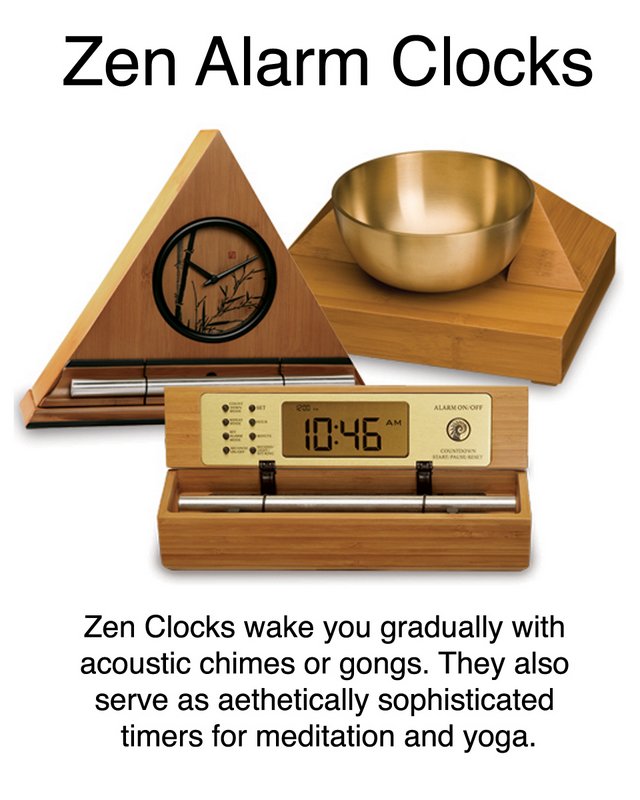 Meditation timers and acoustic clocks
Posted in Bamboo Chime Clocks
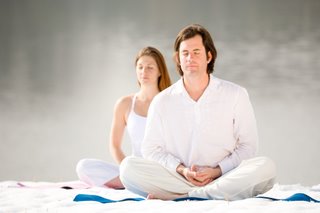 Meditation Can Wish You Well New research suggests that qualities the world desperately needs more of — love, kindness and compassion — are indeed teachable.
Imaging technology shows that people who practice meditation that focuses on kindness and compassion actually undergo changes in areas of the brain that make them more in tune to what others are feeling.
“Potentially one can train oneself to behave in a way which is more benevolent and altruistic,” said study co-author Antoine Lutz, an associate scientist at the University of Wisconsin-Madison.
How far this idea can be extrapolated remains in question, though.
“I think there’s no question that people can benefit from these practices,” said Dr. Louis Teichholz, medical director of complementary medicine and chief of cardiology at Hackensack University Medical Center in New Jersey. “I think the question is how easy is it to get trained enough so that it will make a clinical difference, and I don’t think this study answers that.”
The findings were published in the March 26 issue of the Public Library of Science One.
Recent brain-imaging studies have suggested that the insula and the anterior cingulate cortices regions are involved in the empathic response to other people’s pain. But not much is known about how cultivating compassion might affect brain circuitry.
And previous research has indicated that meditation may reduce the brain’s reaction to pain, and that it may actually improve cardiovascular health by decreasing the risk of metabolic syndrome.
 Meditation Pose “The main research question was to see whether some positive qualities such as loving-kindness and compassion or, in general, pro-social altruistic behavior, can be understood as skills and can be trained,” Lutz explained.
In the same way that training in sports or chess or music produces functional and structural changes in the brain, the Wisconsin researchers wanted to see if cultivating compassion through the practice of meditation also produced brain changes — suggesting that compassion could be viewed as a learned skill.
The study involved 32 people: 16 Tibetan monks and lay practitioners, who had meditated for a minimum of 10,000 hours throughout their lifetime (the “experts”); and 16 control subjects, who had only recently been taught the basics of compassion meditation (the “novices”).
The senior author of the paper, Richard Davidson, a professor of psychiatry and psychology at the University of Wisconsin-Madison and an expert on imaging the effects of meditation, has been collaborating with the Dalai Lama since 1992, studying the brains of Tibetan monks.
For the study, individuals in the control group were instructed first to wish loved ones well-being and freedom from pain, then to wish such benefits to humankind as a whole.
“We looked at whether there were any differences between experts and novices in generating compassion with the idea that a central practice in this tradition [of meditation] is to cultivate these positive emotions,” Lutz said. “We wanted to see if there were any differences in the way the brain was reacting.”
Each participant was hooked up to a functional MRI both while meditating and not meditating. During each state, the participants heard sounds designed to produce responses: the negative sound of a distressed woman, the positive sound of a baby laughing, and the neutral sound of background noise from a restaurant.
“We showed altered activation in brain circuitry that was previously linked to empathy and perspective-taking or the capacity to understand other’s intentions and mental states and, more precisely, the insula was more activated, particularly in response to negative emotional sounds,” Lutz said.
In the monks, especially, these areas of the brain were activated even more when they hard the cries of the distressed woman, she said.
 Meditation The study authors hope the findings might one day help with a range of problems, including reducing the incidence of bullying in schools or helping people with depression.
“The next step is to see if this works,” Lutz said. “If it works, then it can be applied to selective populations — for instance, depressed people or, more broadly, in education.”
More information
The U.S. National Center for Complementary and Alternative Medicinehas more about meditation and health.
Use our unique “Zen Clock” which functions as a Yoga Timer. It features a long-resonating acoustic chime that brings your meditation or yoga session to a gradual close, preserving the environment of stillness while also acting as an effective time signal. Our Yoga Timer & Clock can be programmed to chime at the end of the meditation or yoga session or periodically throughout the session as a kind of sonic yantra. The beauty and functionality of the Zen Clock/Timer makes it a meditation tool that can actually help you “make time” for meditation in your life. Bring yourself back to balance.
adapted from abcnew.go.com by Amanda Gardner
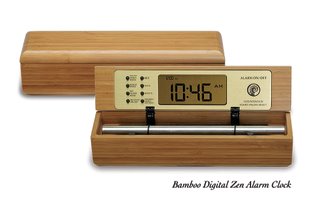 Digital Meditation Timer with Acoustic Chime Now & Zen – The Meditation Timer Shop
1638 Pearl Street
Boulder, CO 80302
(800) 779-6383
orders@now-zen.com
Posted in Bamboo Chime Clocks
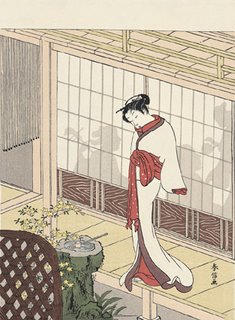 Getting More Sleep Can Improve Your Health - Harunobu Suzuki, Beauty at the Veranda President Bill Clinton’s stamina kept him so keyed up as he travelled around the world recently that it seemed hard to keep up with him, or figure out where we would see him next.
Clinton seemed to blame his recent heart troubles — he was fitted with stents to reopen a clogged artery –on a lack of sleep.
“I tell you what. I was quite tired over Christmas and afterward,” the former president said at a recent press conference. “But from the time of the Haiti earthquake which was a month ago today, I’ve been working a lot without sleeping much.”
And Clinton’s not the only one. Lack of sleep is the most common sleep complaint among Americans, according to the National Sleep Foundation.
Researchers say lack of sleep is connected to cardiovascular disease, hypertension and high blood pressure. It also compromises the immune system, contributes to obesity and severely impairs mental judgment.Dieting might be more difficult too. Recent findings also show that when you are sleep deprived, your body actually boosts production of the hormone that makes you hungry.
But research suggests that getting just one extra hour of sleep each night could dramatically affect your health. In fact, researchers from the University of Chicago found that those who bumped up their hours of sleep, from 6 to 7 hours had a 33 percent decreased chance of having clogged arteries.
But while the thought of sleeping in may seem enticing, for many Americans, it’s easier said than done.
 Getting More Sleep Can Improve Your Health - Harunobu Suzuki, Beauty at the Veranda Struggling to Stay Awake
Susan Roberts of Dahlonega, Ga. suffered from insomnia since childhood.
“I have been struggling with being sleepy all the time. Driving home from work I would have to stop and get a soda and a candy bar just to keep me awake,” Roberts said. “When I do fall asleep I end up waking up every two hours.”
She wakes up at 3:30 a.m. each morning and drives 53 miles one way to work — a routine she says she finds exhausting. Yet, she’s unable to rest. After many waking nights, Roberts said she felt her health and emotional well-being was at risk. Roberts eventually checked herself into the Northside Hospital Sleep Disorder Center in Atlanta.
How to Get that Extra Hour
Amid the hustle of every day stress, there are some simple steps people can take to get a better night’s sleep.
“You need to set aside the time for sleep. You need a few hours to unwind before. It takes time for the brain to wind down,” said Dr. Charles Czeisler, professor of sleep medicine at Harvard Medical School.
At Northside Hospital Sleep Disorders Center Roberts was taught “sleep hygiene,” — a healthy routine that should be practiced before bed.
Stimulants — soda, chocolate, any kind of caffeine — should be avoided at least four hours before bed, she said. She also said that you should not exercise three to four hours prior to sleep. Eating a light meal and eliminating alcohol consumption also helps. And lights should be dimmed and the TV turned off to help prepare the mind to relax into a slumber.
Roberts even quit cleaning her house at night. “I was having a problem going to sleep,” she said. “And doing heavy housework, I might as well have gone to the gym and worked out.”
And calling it an earlier night may show some benefits. In a 2009 study published in the New England Journal of Medicine, heart attacks in Sweden rose by 5 percent in that first week of spring, when many people were adjusting to losing an hour of sleep. In the fall when the clocks are reset, heart attacks dropped, according to the study.
 Getting More Sleep Can Improve Your Health “Most of these findings are so recent that the average physician is unaware of the link between chronic sleep deprivation and cardiovascular disease,” said Czeisler.
After learning more about her own pre-bed habits and changing some behaviors, Roberts is now on the right track with her sleep. She’s in bed by 9:30 p.m.and clocks in at least six hours of sleep– not ideal, but a major improvement for Roberts. Many know that it is not easy to get that extra hour, but as Roberts learned, never has it been so clear that its worth trying.
“I feel more alive, I have more energy, I can get my job done,” she said. “I’m not sitting at my desk falling asleep.” For more information on healthy sleep habits visit UnderstandingSleep.org
Boulder, Colorado—an innovative company has taken one of life’s most unpleasant experiences (being startled awake by your alarm clock early Monday morning), and transformed it into something to actually look forward to. “The Zen Alarm Clock,” uses soothing acoustic chimes that awaken users gently and gradually, making waking up a real pleasure. Rather than an artificial recorded sound played through a speaker, the Zen Clock features an alloy chime bar similar to a wind chime. When the clock’s alarm is triggered, its chime produces a long-resonating, beautiful acoustic tone reminiscent of a temple gong. Then, as the ring tone gradually fades away, the clock remains silent until it automatically strikes again three minutes later. The frequency of the chime strikes gradually increase over ten-minutes, eventually striking every five seconds, so they are guaranteed to wake up even the heaviest sleeper. This gentle, ten-minute “progressive awakening” leaves users feeling less groggy, and even helps with dream recall.
What makes this gentle awakening experience so exquisite is the sound of the natural acoustic chime, which has been tuned to produce the same tones as the tuning forks used by musical therapists. According to the product’s inventor, Steve McIntosh, “once you experience this way of being gradually awakened with beautiful acoustic tones, no other alarm clock will ever do.”
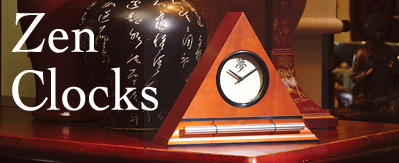 Gentle Zen Alarm Clocks with Chime Now & Zen, Inc.
1638 Pearl Street
Boulder, CO 80302
(800) 779-6383
orders@now-zen.com
Posted in Bamboo Chime Clocks
 Sleepiness Might Be in the Genes No matter how little they sleep, some people can keep a skip in their step while others will yawn and struggle through the day. A new study from the University of Pennsylvania School of Medicine found that the reason could be in our genes.
Researchers found that healthy people with one particular genetic variant were generally sleepier than those without the gene. About 25 percent of the general public has the genetic variant, called DQB1 *0602, but only a small percentage of them actually suffer from sleep problems.
One person who has been told by his doctor that he may have this genetic variation is Robert Gibson, a 43-year-old machine shop supervisor in Milan, Illinois. Sleep is supposed to rejuvenate the body, but for Gibson, it can be anything but invigorating.
 Sleepiness Might Be in the Genes It would not be the only gene-linked sleep condition Gibson experiences; he already suffers from bouts of sleep paralysis, a disorder in which sufferers feel paralyzed as they fall asleep or as they wake up. Episodes can last a few seconds to a couple of minutes, but Gibson said the effects of the temporary paralysis seem to bog him down all day.
“It feels like I am drugged down, like there’s a heavy weight on me the whole next day,” said Gibson.
Gibson’s sleep problems are more than just the garden-variety; years ago, doctor’s did find a genetic biomarker that may have to do with his sleep disorders, and, because many genes probably contribute to sleep habits, doctors say Gibson probably has DQB1 *0602 as well.
“He hasn’t been tested for this gene yet, but it could be part of the spectrum of genes that contribute to his sleep habits,” said Dr. Mark Dyken, a professor of neurology at University of Iowa College of Medicine who treated Gibson.
Genes and Heavy-Eyes
For the study, researchers compared healthy people with the gene variant to healthy people without it to see if they suffered from any other sleep-related problems.
The research, published in the journal Neurology, found that people with the gene variant reported feeling sleepier and more fatigued compared to the people without the variant, whether they slept four hours or 10 hours. People with the gene variant also spent less time in deep sleep, and woke up more times during their sleep compared to the non-gene participants.
“When the genetic variant people were fully rested, they still rated themselves sleepy,” said Dr. Namni Goel, lead author of the study and assistant professor of psychiatry at the University of Pennsylvania School of Medicine. “They had a lower drive to sleep when challenged by sleep loss, and overall they had a more fragmented sleep with more arousals in comparison to those who didn’t carry the gene. We found it very interesting that they were healthy people, but when challenged, they looked like narcoleptics.”
 Sleepiness Might Be in the Genes Could Some Sleepiness Be Genetic?
In the study, 92 healthy adults without the gene were compared to 37 healthy adults who had the gene but did not have a sleep disorder. Researchers tested each participants’ sleep quality and self-rated tiredness. They also tested memory, attention, and the ability to resist sleep during the day.
The participants spent seven days in the sleep laboratory. For the first two nights, everyone spent 10 hours in bed. For the following five nights, participants only spent four hours in bed per night. During waking hours, the lights were kept on, and they were allowed to play games, read, and watch movies. They were not allowed to consume foods and drinks that could affect their sleep, such as caffeine, turkey, bananas, or alcohol.
Despite the inconsistent sleep patterns throughout the seven-day trial, results for the memory and cognitive skills were similar in both groups.
The Role of Sleep
Dr. Mark Mahowald, medical director of the Minnesota Regional Sleep Disorders Center, said that the study results are important because people tend to make sweeping statements about sleep deprivation — when sleep is different for everyone because there are huge genetic components that contribute to our slumber.
“The medical profession has been guilty for decades ofsleep deprivation in its trainees, so they made recommendations of the number of hours someone should work, but they made across-the-board, sweeping recommendations,” said Mahowald. “The implication is that everyone is sleep-deprived and sleep-deprivation does the same thing to everyone, but the tolerance and range of sleep is so different for different people.”
“A one-size-fits-all policy is probably not a very wise idea when it comes to sleep,” said Mahowald. “Our society has equated sleepiness with defects of character, like laziness and depression, but really, some people are generally sleepier during the day. They’re more prone to naps, and to sleeping in. We have to accept the fact that sleep duration is genetically determined and not a sign of defect.”
No Rest for the Weary
So what’s a tired person to do? Not much, said doctors, but Dr. Goel said she hopes to continue her research with genetic biomarkers. She said they might help to predict a person’s response to sleep deprivation, especially for those who work a night shift, travel often through many time zones, or those who lose sleep due to personal or family obligations. At any rate, doctors said that tiredness is certainly a manageable condition.
“Down the line, if someone is carrying this gene, maybe they can employ a countermeasure,” said Goel. “Maybe they could have caffeine to counteract some of these symptoms.”
Boulder, Colorado—an innovative company has taken one of life’s most unpleasant experiences (being startled awake by your alarm clock early Monday morning), and transformed it into something to actually look forward to. “The Zen Alarm Clock,” uses soothing acoustic chimes that awaken users gently and gradually, making waking up a real pleasure. Rather than an artificial recorded sound played through a speaker, the Zen Clock features an alloy chime bar similar to a wind chime. When the clock’s alarm is triggered, its chime produces a long-resonating, beautiful acoustic tone reminiscent of a temple gong. Then, as the ring tone gradually fades away, the clock remains silent until it automatically strikes again three minutes later. The frequency of the chime strikes gradually increase over ten-minutes, eventually striking every five seconds, so they are guaranteed to wake up even the heaviest sleeper. This gentle, ten-minute “progressive awakening” leaves users feeling less groggy, and even helps with dream recall.
adapted from abcnews.go.com by Mikaela Conley
Now & Zen – The Chime Alarm Clock and Timer Shop
1638 Pearl Street
Boulder, CO 80302
(800) 779-6383
orders@now-zen.com
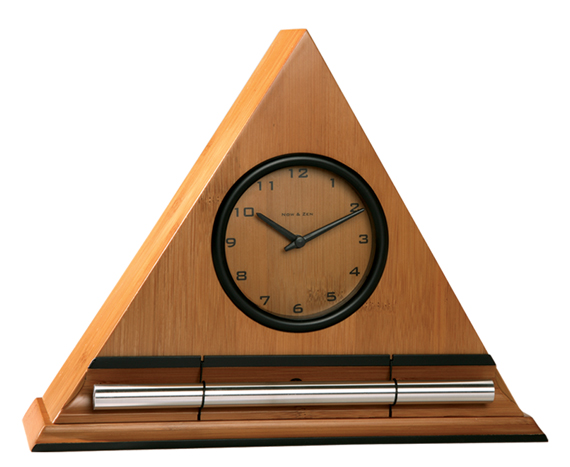 The Zen Alarm Clock for a Gradual Awakening
Posted in Bamboo Chime Clocks
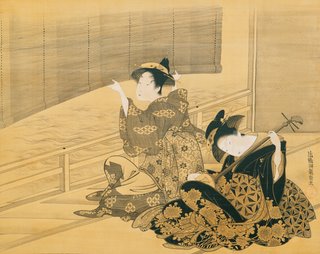 Isoda Koryusai, Japanese (active c. 1764–1788) Change Your Alarm Clock…
The Digital Zen Clock’s long-resonating Tibetan bell-like chime makes waking up a beautiful experience – its progressive chimes begin your day with grace. When the clock’s alarm is triggered, the acoustic chime bar is struck just once … 3-1/2 minutes later it strikes again … chime strikes become more frequent over 10 minutes … eventually striking every 5 seconds until shut off. As they become more frequent, the gentle chimes will always wake you up – your body really doesn’t need to be awakened harshly, with a Zen Clock you’re awakened more gradually and thus more naturally. Unlike artificial recorded sounds coming out of a tiny speaker in a plastic box, natural acoustic sounds transform your bedroom or office environment.
The Digital Zen Clock also serves as a countdown and interval timer for yoga, meditation, bodywork, etc.; and it can also be set to chime on the hour as a tool for “mindfulness.”
Digital Zen Clocks feature a “high” and “low” chime strike volume control, which allows you to adjust the sound of the chime to suit your needs. The Digital Zen Clock runs on 2 AA batteries (not included) and can also be plugged in with the included AC jack. The clock includes a lighted digital display (which can be set to be lit full-time when plugged in).
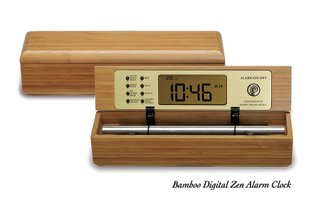 change your alarm clock so you eliminate the shock in your life Now & Zen’s Clock Store
1638 Pearl Street
Boulder, CO 80302
(800) 779-6383
Posted in Bamboo Chime Clocks, Natural Awakening, Now & Zen Alarm Clocks, sleep, Sleep Habits
 harunobu suzuki, Beauty at the Veranda
For most women who chronically bump along on near empty, it’s no mystery that getting to bed a little earlier would help. “The sleep system really does work like a bank,” says William Dement, MD, PhD, who—as chief of the sleep medicine division at the Stanford University School of Medicine—should know. “We can keep going for a long time on borrowed energy because our survival mechanisms kick in. At some point, however, every hour lost needs to be paid back.” But instead of the pillow, we’ll often reach for coffee—37 percent of American women chug more than three caffeinated beverages a day, according to the National Sleep Foundation—or a glass of wine, or something sweet, or the remote control to “wind down” with Anderson Cooper, who’s inevitably reporting from a war zone with things blowing up in the background. None of these efforts restores energy—some, in fact, do the opposite. Even when you do finally climb into bed, there are times when anxiety invades your sleep, leaving you bleary-eyed and dragging day after day. So we decided to investigate what—short of permanent residency at a spa—gives you a real rest.
Paradoxically, according to the newest research, when you’re looking for a profound rest cure, rather than trying to tune out, you may be better off tuning in and anchoring your awareness in the present moment. You can approach such engagement through various routes, like fully using your senses, practicing mindfulness, getting into a flow state, and—most difficult for many, but perhaps most effective—giving up the need to be in control.
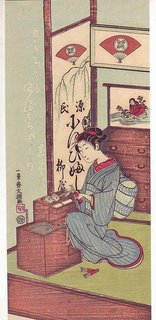 tune in Loch Kelly, A New York Buddhist-trained psychotherapist and meditation teacher, uses a technique called “resting in the heart space” to help people relinquish the reins; in his experience it provides the deepest rest in the shortest amount of time. “Traditionally, meditation focuses on getting to a state so neutral that there isn’t a problem to solve. Some monks spend 20 years in isolation working on just that.” But anyone, Kelly claims, can attain a sense of flow—and many of us already do through ordinary activities like gardening, knitting, working, or driving. When you’re in a car, for example, you have to focus on the road as it looks in the moment and, at the same time, stay alert to continually anticipate the next move. Eventually, your brain resolves the two directions it’s working in by falling into a rhythm, which leads to an open state of awareness that Kelly calls flow. You’re most likely to feel it after an unfettered drive in the country—no urgent sense of time passing or future demands impinging, but rather a merging into the current, a harmony with the environment as the present unfolds. “There’s something that’s unhooked from the mind, prior to thought, and at the same time intelligent,” Kelly says. “You can respond quickly.” Entering this flow state signals the brain that you’re safe, not in danger mode.
Once you’ve gotten a sense of what flow is, you’re ready for the heart space meditation. Kelly suggests deciding ahead of time how long you can allow yourself to rest—people usually do it from one to 20 minutes, but you may want to go longer. To prepare, take a big inhalation, filling your stomach from the bottom to the top like a water pitcher. Exhale as you normally would. Next, look up and gradually allow your peripheral vision to expand, a gesture intended to keep you engaged with your surroundings. Smile to tell yourself that you’re doing something you enjoy.
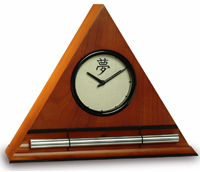 get the rest you need
Boulder, Colorado—an innovative company has taken one of life’s most unpleasant experiences (being startled awake by your alarm clock early Monday morning), and transformed it into something to actually look forward to. “The Zen Alarm Clock,” uses soothing acoustic chimes that awaken users gently and gradually, making waking up a real pleasure. Rather than an artificial recorded sound played through a speaker, the Zen Clock features an alloy chime bar similar to a wind chime. When the clock’s alarm is triggered, its chime produces a long-resonating, beautiful acoustic tone reminiscent of a temple gong. Then, as the ring tone gradually fades away, the clock remains silent until it automatically strikes again three minutes later. The frequency of the chime strikes gradually increase over ten-minutes, eventually striking every five seconds, so they are guaranteed to wake up even the heaviest sleeper. This gentle, ten-minute “progressive awakening” leaves users feeling less groggy, and even helps with dream recall.
By Sara Reistad-Long
O, The Oprah Magazine
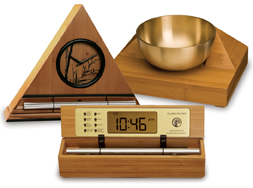 Now & Zen's Family of Alarm Clocks
Now & Zen’s Chime Alarm Clock Shop
1638 Pearl Street
Boulder, CO 80302
(800) 779-6383
Posted in Bamboo Chime Clocks, Chime Alarm Clocks, Natural Awakening, sleep, Sleep Habits
 Sleeplessness Finding yourself wide awake after a few hours of sleep, or waking often during the night is called “parasomnia” or “sleep maintenance insomnia,” and it’s much more common than people think. A 2005 National Sleep Foundation poll found that 75 percent of adults frequently have symptoms of sleep dysfunction, including waking during the night.
Just as the victims in slasher flicks make fatal errors (why are you running up the stairs?), we are often our own worst enemies when it comes to a solid night of sleep. “People think that because they’re able to fall asleep they’ll stay asleep, even if they’ve had too much caffeine,” says Rubin Naiman, Ph.D., a sleep and dream specialist at Andrew Weil’s Program in Integrative Medicine at the University of Arizona.
But for most of us, trouble sleeping isn’t usually caused by that espresso at 5 p.m. “The root of most sleep problems is stress,” says Jeffrey Thompson, director of the Center for Neuroacoustic Research and creator of an audio sleeping aid called the Delta Sleep System.
We’re overloaded, over-stimulated, and overwhelming our bodies’ ability to relax. “Our nervous system is built for a sprint, but we’re living in a stress marathon,” he says. “If you go to bed worried you’re probably going to wake up in the middle of the night,” Dr. Naiman adds. And when sleeplessness happens, as you probably know, the next day is pretty much shot.
A new generation of sleep scientists are overturning the conventional wisdom about parasomnia. (Counting sheep? Out.) The doctors say: You can do it. With a few simple changes in your routine, a little visualization, a couple of surprisingly counter-intuitive moves and perhaps an attitude adjustment, a peaceful night of slumber can be yours. Here’s their best advice:
Throw out your definition of a good night’s sleep
Just as three meals a day has given way to all-day grazing and smaller portions, “what’s good for you” has changed here, too.
“Thinking it’s necessary to stay asleep for 8 hours straight may be unrealistic,” says David Neubauer, M.D., associate director of the Johns Hopkins Sleep Disorders Center and author of Understanding Sleeplessness: Perspectives on Insomnia. “Just as we experience a dip in alertness mid-afternoon, the inverse is a dip in sleepiness in the middle of the night. There’s strong evidence that there’s a kind of awakening that’s totally normal.” History supports this take, Dr. Naiman says. “Before the industrial revolution, people had their first sleep for 3 to 4 hours, awoke for an hour or two, then slept for another 3 or 4 hours.”
Even waking every 60 to 90 minutes can be part of a healthy sleep pattern. The deeper stages of sleep, or REM (rapid eye movement) sleep, occur about every 90 minutes and get longer as the night goes on, so your brain might become more alert between those cycles.
 Sleeplessness Since we’re conditioned to think that waking during the night is a problem, when it happens, we panic. That reaction causes our brains to awaken even further, Dr. Neubauer explains.
If you find yourself awake in pre-dawn hours, Dr. Naiman advises first assessing your physical state. Do you have an ache, a cramp, or need to go to the bathroom? If so, take care of it.
If you don’t have a physical complaint, then chances are you are experiencing a normal stage of the sleep cycle. Knowing this “helps replace worries that you’ll be useless without 8 solid hours of sleep with more neutral thoughts,” suggests Sat Bir Khalsa, Ph.D., instructor in medicine at Brigham and Women’s Hospital at Harvard Medical School. “The useful thought is: ‘I can handle the disruption and still feel rested.'”
Get bed-ready
After an action-packed day (or one equally packed with worry), our brains need some time to catch up, to make order of things, and to slow their frenetic firing before we’re ready to sleep. Pure bodily exhaustion can probably get you at least that first hour of dozing, but then worries will rise to the surface and cause you to stir. How can you get your mind to chill?
“We need to learn to apply the brakes before the car is in the garage,” Dr. Naiman says. “Clearing your head is key to a good night of sleep.” Simply taking 15 minutes to sit quietly, meditate, pray, or do rhythmic breathing can allow your mind to slow down enough to sleep through the night.
Establishing any ritual that you do before bed—anything but checking your e-mail!—will do more than relax you right then and there. The repetition also conditions your brain and body for sleep, Thompson explains.
While you’re transitioning to Z-mode the same way night after night, you’re also creating a Pavlovian response to your ritual. So simply sitting in the spot where you do your breathing or turning on the shower water signals your mind that it will be sleeping soon, Thompson says.
Another way to condition yourself sleepward is by playing off the body’s internal clock. Dr. Naiman suggests simulating dusk about an hour before you plan to go to bed and dimming the lights significantly. This triggers natural circadian rhythms that help us prepare for sleep.
adapted from Women’s Health Magazine, by BY LIESA GOINS
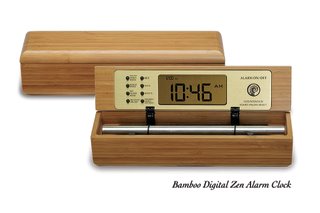 Wake up refreshed, love your alarm clock, transform your mornings with The Zen Alarm Clock's progressive awakening with gentle chimes.
Now & Zen – The Chime Alarm Clock Shop
1638 Pearl Street
Boulder, CO 80302
(800) 779-6383
Posted in Bamboo Chime Clocks
 Feel the Joy: Utamaro Kitagawa, The Courtesan Hanaogi of Ogiya You don’t have to work for happiness. It’s already here to be experienced in every moment.
Janet began her long-planned kitchen remodel filled with dread, certain it would be a difficult experience. A self-described “aversive type,” she knew that her often uncompromisingly high standards, coupled with a tendency to dwell on all the things that might go wrong, were likely to make the project a source of frustration and tension. Janet decided that instead of her usual cycle of anger and impatience, she wanted to have a more positive, joyful experience with the remodel.
Getting clear on her intention to feel joy helped her realize that the attitude she had toward the project would determine not only how she would feel about its outcome but also how rewarding the process would be. She realized that making friends with the workers on the job would be a major step in supporting her positive outlook. “I grew to really care about the people doing the work and looked forward to seeing them each day, learning to trust their judgments and taste,” she said.
She also reasoned that if she could feel satisfaction about the work as it progressed, then that same satisfaction would be there in the completed kitchen. She made a point to look each day for different ways the project gave her a chance to feel pleased. And her theory proved to be true. The pleasure she took in the details of the completed kitchen went deeper than pleasure at the cosmetic and structural improvements.
“When I look at that space, when I get a glass of water or cook a meal, I feel so happy. The whole house feels happier to me and more precious,” Janet reflects. To her surprise, the remodel became a joyful experience from beginning to end.
How do you turn a dreaded kitchen remodel, or any other potentially difficult circumstance, into a nourishing experience and a source of happiness? By changing the default setting of your mind and heart toward greater well-being and feelings of joy.
 Feel the Joy You do not have to create joy; it is an innate quality already within you, like the capacity to walk or to be kind. You come into this world as an innocent baby with a natural joy. You can still squeal with delight, given the right circumstances. What you likely forget, though, is that you can feel this joy even when the circumstances aren’t just right. In fact, this natural joy is available at all times, and you can consciously cultivate it so that it’s easily accessible, even during difficult moments.
Joy comes in many flavors. For some, it’s an energetic radiance; for others, it’s a quiet feeling of connection. We all have our own way of expressing joy that comes with our unique temperament. In fact, the word “joy” may be a stretch for people who long simply to not be miserable! Those who find “joy” awkward might prefer another word, like “contentment,” “delight,” “happiness,” or “aliveness.” When I use the word “joy,” I often think of it simply as a feeling of well-being.
Truly happy people are not happy all the time. The 10,000 joys and 10,000 sorrows, to use the Taoist phrase, are part of the full tapestry of life. Being joyful does not mean you stop feeling the full range of human emotion. Life is often hard. You get disappointed. A loved one becomes ill or dies. You feel stress in your relationships, finances, or crowded schedule.
Awakening your joy does not mean denying any of these things. Rather, those who discover the secret of well-being are capable and centered and able to be authentically engaged with whatever circumstances life presents. Although you feel the full spectrum of emotions, you know that anger, sadness, and fear are only temporary visitors. With practice, a feeling of well-being can become the baseline that you return to, rather than an occasional surprise. How do you begin this process? The important first step, as Janet discovered, is to set a clear intention to foster greater well-being in your life.
Put Happiness First
We all want to be happy, but many of us don’t put this desire at the center of our lives. We think that if we are successful, rich, or well liked, happiness will follow. But to awaken our natural joy, it’s essential that we consciously prioritize our intention to be happy. For instance, once Janet decided she wanted her project to be a source of joy rather than frustration and anxiety, she was more motivated to find strategies that would support that central intention. In getting clear on your intention for happiness, you access the place inside that truly wants you to be happy.
The next key step is understanding where real happiness lies. In order to experience genuine well-being, the Buddha encouraged developing what he called wholesome, or healthy, states of mind. These states, such as kindness or generosity, have an expansive quality; they open your heart and create more ease in your mind. They are different from unwholesome states, which fan your desires and provide fleeting pleasure but actually contract the mind and lead to suffering. Taking an honest look at what states contribute to an inner ease and expansiveness, and then cultivating them, is an important part of the process.
The Buddha points out that accompanying these healthy states is a natural feeling of gladness. For example, in the middle of a random act of kindness, you can notice this gladness. By bringing mindful attention to the sensations generated in the body and mind, you strengthen this “gladness connected with what is wholesome,” as the Buddha describes it. More than just “feeling good,” you learn to recognize what it feels like to feel good. By becoming more aware of the landscape of well-being, you amplify your joy.
For example, one practice the Buddha recommends to develop well-being is simplicity, or what I refer to as “the joy of letting go.” This is particularly relevant if you tend to fill up your life by taking on more than you can possibly handle. Simplicity can mean bringing more balance to an overcrowded, busy life. To use simplicity as a joy practice, consciously choose to say no to the next delicious invitation, or decide not to add one more “important” task to your schedule. Then notice how good it feels in your body and mind to give yourself the space that opens with that de-cluttering.
 Feel the Joy With some practice, you can not only feel happy in the moment but you can also develop that joy as a habitual response. In one discourse, the Buddha simply and profoundly explains how habits are created: “Whatever the practitioner frequently thinks and ponders upon, that will become the inclination of his mind.” You are making either skillful grooves or unpleasant ruts with repetitive habits of thought. Modern neuroscience has corroborated this: Through repetition you strengthen positive neural pathways in the brain. By frequently inclining the mind toward thoughts associated with greater well-being, you begin to shift your habitual thinking. And the shift becomes deeper still when you act on those thoughts and impulses. As you practice being present for moments of joy as they occur and nourish your spirit in healthful ways, you create the conditions for well-being to arise naturally.
As Janet found, “Even in difficult and challenging moments, there is a deep vein of joy underneath that can be mined. This joy is found whenever I can be present with exactly what is. I’ve never experienced this as joy before, but now I do. I have learned to notice the deep joy I experience in simply being alive.”
Use our unique “Zen Clock” which functions as a Chime Yoga Timer. It features a long-resonating acoustic chime that brings your meditation or yoga session to a gradual close, preserving the environment of stillness while also acting as an effective time signal. Our Yoga Timer & Clock can be programmed to chime at the end of the meditation or yoga session or periodically throughout the session as a kind of sonic yantra. The beauty and functionality of the Zen Clock/Timer makes it a meditation tool that can actually help you “make time” for meditation in your life. Bring yourself back to balance.
Adapted from YogaJourna.com by James Baraz, a founding teacher at Spirit Rock Meditation Center, leads an online course, Awakening Joy, and has co-written the book, Awakening Joy.
Now & Zen – The Chime Meditation Timer and Alarm Clock Shop
1638 Pearl Street
Boulder, CO 80302
(800) 779-6383
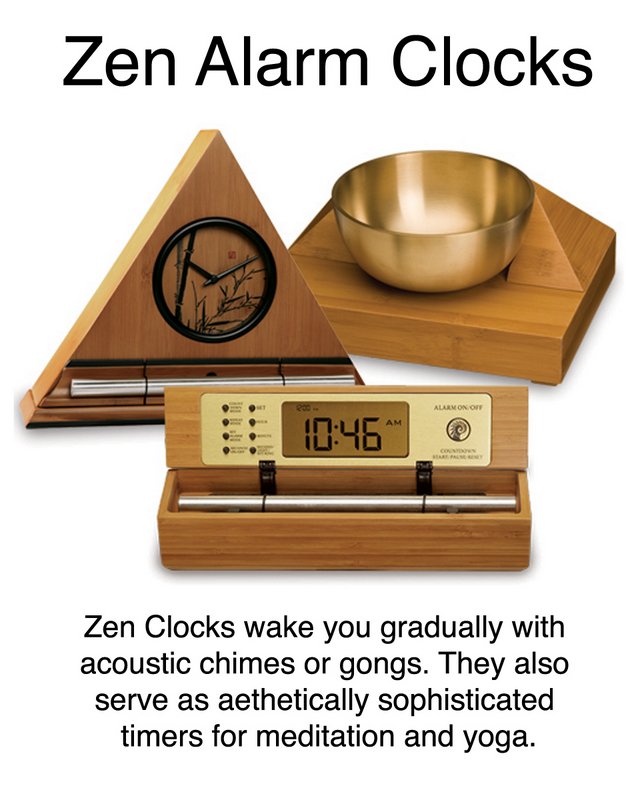 Chime Meditation and Yoga Timers and Alarm Clocks
Posted in Bamboo Chime Clocks
 Sanmonji, sleeping cat Perfect alarm clock gift makes waking up a calming and relaxing experience
Replace Your Loved Ones Alarm Clock, so that you don’t have to be awakened by their Frightening, Beeping Alarm Clock…
Are you tired of your husbands alarm clock?
What makes this gentle awakening experience so exquisite is the sound of the natural acoustic chime, which has been tuned to produce the same tones as the tuning forks used by musical therapists. According to the product’s inventor, Steve McIntosh, “once you experience this way of being gradually awakened with beautiful acoustic tones, no other alarm clock will ever do.”
Boulder, Colorado—an innovative company has taken one of life’s most unpleasant experiences (being startled awake by your alarm clock early Monday morning), and transformed it into something to actually look forward to. “The Zen Alarm Clock,” uses soothing acoustic chimes that awaken users gently and gradually, making waking up a real pleasure. Rather than an artificial recorded sound played through a speaker, the Zen Clock features an alloy chime bar similar to a wind chime. When the clock’s alarm is triggered, its chime produces a long-resonating, beautiful acoustic tone reminiscent of a temple gong. Then, as the ring tone gradually fades away, the clock remains silent until it automatically strikes again three minutes later. The frequency of the chime strikes gradually increase over ten-minutes, eventually striking every five seconds, so they are guaranteed to wake up even the heaviest sleeper. This gentle, ten-minute “progressive awakening” leaves users feeling less groggy, and even helps with dream recall.
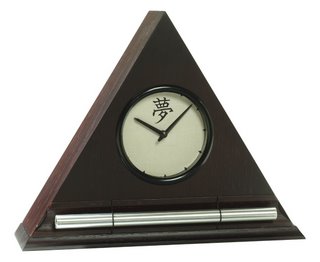 zen alarm clocks for a peaceful awakening Now & Zen’s Clock Store
1638 Pearl Street
Boulder, CO 80302
(800) 779-6383
Posted in Bamboo Chime Clocks, Now & Zen Alarm Clocks, Progressive Awakening, sleep, Sleep Habits, Well-being
 getting enough shut-eye? Children and Sleep: Is Your Child Getting Enough Shut-Eye?
How to tell if your child is not getting enough sleep
For many active school-aged children, sleep can be as hard to come by as it is for busy adults. After-school activities, homework, and playtime with family and friends can all lead to a packed schedule. Add to that the lure of electronics such as TV, computers and videogames, and you have the makings of chronic sleep deficit in kids.
Since school-aged children need between 10 to 11 hours of sleep, parents must be vigilant about enforcing bedtimes, setting up good sleep routines, and watching for signs of fatigue in their children. It’s especially important for school-aged kids to get enough rest. For one thing, one of the factors that can reduce one’s immune system’s ability to fight off infections is not getting enough sleep, and as we know, kids in school are constantly exposed to transmittable illnesses such as colds from classmates. Lack of sleep in children has also been associated with health problems ranging from obesity to mood swings, as well as cognitive problems that can have an impact on a child’s ability to concentrate, pay attention, and learn in school.
Signs of Sleep Deprivation in Children
If you think your child might not be getting enough sleep, look for these signs that she is not getting the amount of sleep she needs. Your child is sleep deprived if she:
- Has trouble waking up in the morning
- Exhibits irritable behavior
- Seems overly emotional and moody
- Is hyperactive
- Has difficulty concentrating in school
- Has trouble staying awake during the day
If you see signs of sleep deficit in your child, try setting up some good nighttime sleep routines and healthy sleep habits to help your child get the amount of rest she needs to be at her best both at home and at school.
Remember that waking up in the morning should be as pleasant as falling asleep at night. The Zen Alarm Clock’s gradual, gentle awakening is transformative.
The Zen Clock’s long-resonating Tibetan bell-like chime makes waking up a beautiful experience – its progressive chimes begin your day with grace.
When the clock’s alarm is triggered, the acoustic chime bar is struck just once … 3-1/2 minutes later it strikes again … chime strikes become more frequent over 10 minutes … eventually striking every 5 seconds until shut off. As they become more frequent, the gentle chimes will always wake you up – your body really doesn’t need to be awakened harshly, with a Zen Clock you’re awakened more gradually and thus more naturally.
Waking up in the morning should be as pleasant as falling asleep at night. The Zen Alarm Clock’s gradual, gentle awakening is transformative.
Waking up in the morning should be as pleasant as falling asleep at night. The Zen Alarm Clock’s gradual, gentle awakening is transformative.
By Katherine Lee, About.com Guide
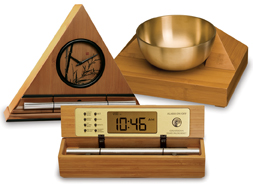 Enhance your sleep rituals by getting the most soothing alarm clock Now & Zen’s Headquarter Clock Shop
1638 Pearl Street
Boulder, CO 80302
(800) 779-6383
 The Zen Alarm Clock Store in Boulder, CO
Posted in Bamboo Chime Clocks, Natural Awakening, sleep, Sleep Habits
« Previous Page — « Previous Entries
Next Entries » — Next Page »
|
|
|
|